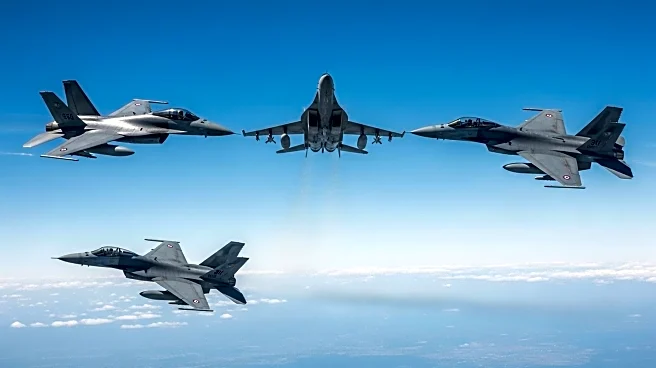What's Happening?
The United States, South Korea, and Japan have initiated a joint air and naval exercise named Freedom Edge off the coast of South Korea's Jeju Island. This exercise, which runs through Friday, aims to enhance the trilateral defense cooperation among the nations, focusing on sea, air, and cyberspace operational capabilities. The U.S. Indo-Pacific Command has highlighted the inclusion of U.S. Marine and Air Force aerial assets, along with advanced ballistic-missile and air-defense drills, medical evacuations, and maritime operations training. The exercise is a response to North Korea's growing nuclear and missile threats, according to South Korea's Defense Ministry. North Korea has condemned the drill as a 'reckless show of strength,' with Kim Yo Jong, sister of North Korean leader Kim Jong Un, warning of negative consequences for the participating countries.
Why It's Important?
This joint military exercise underscores the strategic alliance between the United States, South Korea, and Japan in countering North Korean threats. It reflects the ongoing tensions in the region, as North Korea continues to develop its nuclear and missile capabilities. The exercise is significant for regional security, demonstrating a united front against potential aggression from North Korea. It also highlights the geopolitical dynamics involving North Korea's alignment with Russia, as Kim Jong Un prioritizes strengthening ties with nations opposing the United States. The drill may influence diplomatic relations and military strategies in the Asia-Pacific region, affecting the balance of power and security policies.
What's Next?
The continuation of such military exercises could lead to further military demonstrations or weapons tests by North Korea, as it has done in the past in response to joint drills by its rivals. The exercise may also prompt diplomatic discussions or negotiations aimed at reducing tensions and addressing North Korea's weapons programs. The involved nations might explore additional measures to bolster their defense capabilities and deterrence strategies. The geopolitical implications could extend to broader international relations, particularly concerning North Korea's ties with Russia and its impact on global security dynamics.
Beyond the Headlines
The exercise raises questions about the long-term implications for regional stability and the effectiveness of military deterrence strategies. It also highlights the ethical considerations of military preparedness versus diplomatic engagement in resolving conflicts. The involvement of advanced military technology and coordination among the three nations may set a precedent for future defense collaborations, influencing global military alliances and security policies.








